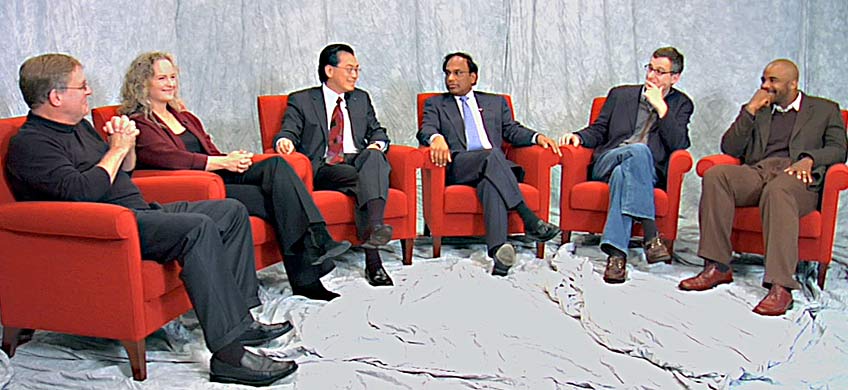
(page 3 of 7)
Denis Wirtz: I feel that we are succeeding in some way. I see kids in the classroom today who are so much more interested than the kids in my classroom 20 or 30 years ago. Really, they think much more in terms of collective responsibility, of wanting to do good in the world.
Margaret Moon: I was thinking about what sort of education works best for a democratic society, and is it that? Is it teaching people to make the world a better place? Or is it an education that sort of insists that people ask hard questions and focus on becoming the loyal opposition, if that’s what’s needed?
Yash Gupta: That sense of trusteeship that Professor Dang talked about in terms of making a difference in other people’s lives, that is missing. We need to teach people that they will become the trustees of the future. They may not accrue the benefit of what they do today for themselves, but maybe in 100 years, 200 years, the world will be very different as a result of what they do.
Chi Dang: Individualism, the creativity to advance technology, and the ability to disseminate that technology for the public good are all intertwined, in that we need to solve disparities in how technologies get out to the public, and who benefits from them.
Yash Gupta: To get there, there has to be a different business model. A year ago, GE announced it would spend $3 billion to create 100 new health care technologies. One of them is this ultrasound machine that costs about $15,000 to $25,000 for the Chinese market, and is of a significantly smaller size than the usual device. There is no way you could sell the typical machine for $300,000 in rural China. Through that innovation, they developed an EKG machine for about $1,000. They are now being used at the sites of accidents in the United States. So, there is a possible way to remove those disparities by producing technologies that are for those nations that simply cannot afford and benefit from the costly original technology, and then using them in applications here as well. But companies and organizations in society are going to have to believe in that. And they will because there are undersold markets and organizations that can create enormous amounts of profit.
Margaret Moon: How we respond to technology really ought to be understood as a reflection of our sense of justice. I don’t think we ever have public debate about that. So we have businesspeople, and if we’re lucky they’re thinking about what they want to happen and how they see themselves as members of society, but then again maybe they don’t. Really, it would be great if we could have a more open public discussion of our sense of justice and what we mean by that. Because we’re not a society that really is about equity, right?
Yash Gupta: There is a capitalistic effect that’s likely to happen. I mean, if you take the world population now—about 6.8 billion—that is going to grow to about 9.4 billion in about 30 years, and where will the growth be? In sub-Saharan Africa. South Asia. A little bit of Latin America. We have an interest in that part of the world because that’s where the customer is, and that’s where workers will be. The social justice issue has to be combined with the cause and the purpose of economic development.
Michael Vlahos: My research focus is on what I call this crisis of globalization that you’re alluding to. I’m not predicting this, but my sense is that we’ve now passed the lowest possible threshold for a global crisis to occur. I’ve tried to create three baskets that need to be holistically integrated so we can look at this. One I call earth shocks. That includes an imminent decline in liquid energy. The second is human shifts. There, I’m interested in how populations that are under stress transform themselves. The incredible mixing of people in the period of globalization has really opened the door to this emergence of new identities, these shifts in consciousness. And large numbers of people are going to be facing the acceleration of physical stressors in the next few years. The final basket I call network stress, and we have a huge network of networks in this world—a financial network, information network, transportation network, and human network. All of these networks are dependent on each other, and I think there’s a lot of fragility to the network and that under stress things could begin to come apart. Part of network stress is not simply a function of earth shocks; it’s also a function of how people respond to the challenges. You can have all sorts of negative feedback loops that could tip things over the edge. We were one weekend away, this past fall, from a financial collapse—and that was the one network that we had the most leverage over. These other networks, they’re not so easily adjusted. So, what I’m trying to do is get a sense of not the most negative but something realistically negative. In other words, I’m not looking at a Permian extinction in 40 years. But in a moderate worst case, where could we be in 40 years?
Yash Gupta: If you look at the migration issue that you mentioned, there is some self-interest on the part of the society to adjust immigration policies to the needs of our world, such as how we man our laboratories and take care of our engineering processes.
